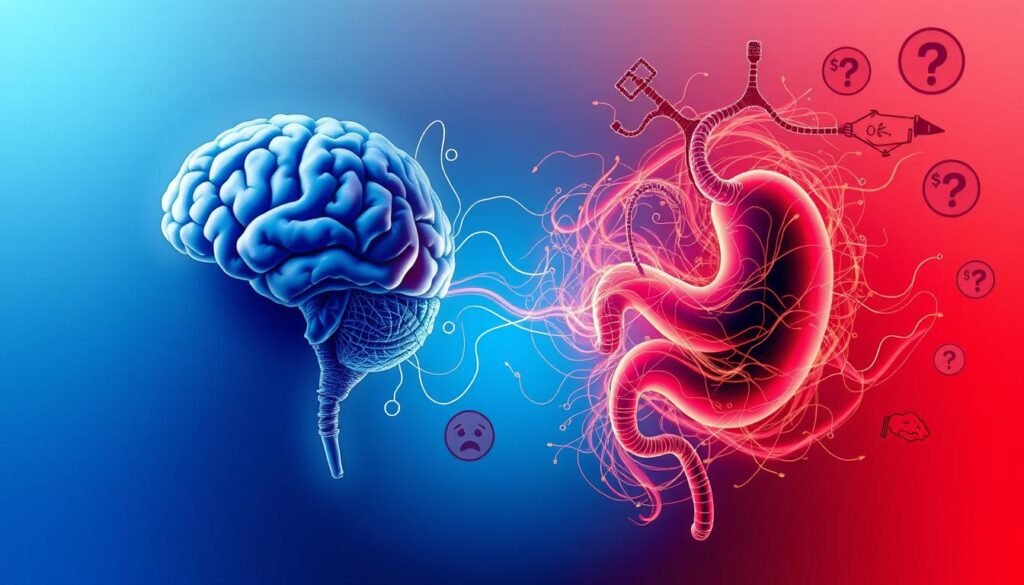Research shows that 1 in 5 people have stomach problems because of stress and anxiety. This statistic points out how common it is to wake up feeling anxious in the stomach. Many wake up with this feeling, wondering why it happens and how it affects their health. Learning about the causes of morning stomach tightness is key. This knowledge can greatly enhance one’s life quality.
Key Takeaways
- The gut and brain are closely connected, influencing each other’s functions.
- Many individuals in high-stress jobs report waking up with anxiety stomach aches.
- Common morning anxiety symptoms can include nausea and digestive issues.
- Understanding the causes of morning anxiety can help in developing effective coping strategies.
- Relaxation techniques and dietary changes can alleviate symptoms.
- Using herbal remedies may help soothe nervous stomach sensations.
Understanding Morning Anxiety
Morning anxiety is feeling uneasy right after you wake up. It affects many people and can make mornings tough. About 36% of people feel anxious in the morning. This may be because of stress or anxiety disorders.
The cortisol awakening response plays a big role. When we wake up, our body releases cortisol. This can make us feel more anxious. Especially for those with Generalized Anxiety Disorder (GAD), morning can bring a lot of worry. They may worry about work, relationships, or health, adding to morning anxiety.
Physical symptoms often come with morning anxiety. Half of the people may feel stomach pain. Others might have chest tightness, headaches, or heart problems. These symptoms show the link between our feelings and body.
How we live can change morning anxiety levels. Exercise, good sleep, and eating well help. Starting the day with meditation or yoga might make mornings better. For tips on recognizing anxiety signs, check out this link: To learn more.
Common Symptoms of Morning Anxiety
Morning anxiety shows up in many ways that affect our well-being. It begins with nervousness early in the day. This feeling can cause what some call an anxious stomach upon waking.
Some key morning anxiety symptoms include:
- Feelings of restlessness
- Difficulty concentrating
- Physical sensations such as nausea or “butterflies” in the stomach
- Rapid heartbeat
- A sense of impending doom or worry
These symptoms are tightly linked to high stress levels. People with anxiety disorders tend to have more cortisol in the morning. This increase plays a big role in morning anxiety.
Drinking caffeine can also make anxiety worse. If you feel anxious in the morning, try drinking less caffeine. It helps to live a healthier lifestyle too.
Getting to know these symptoms is the first step in managing them. Creating a peaceful morning routine can reduce anxiety. It gives you control over your day. For more tips, visit this website.
Everyone experiences morning anxiety differently. Recognizing this is important for coping well. Practices like mindfulness, exercise, and proper sleep hygiene can lower morning anxiety. They improve life quality too.
| Symptom | Description |
|---|---|
| Nervousness | A feeling of unease or worry that often accompanies morning anxiety. |
| Stomach Discomfort | Physical sensations in the stomach such as nausea or “butterflies”. |
| Rapid Heartbeat | An increase in heart rate often experienced during anxiety episodes. |
| Difficulty Concentrating | Struggles to focus on tasks due to overwhelming worries. |
| A Sense of Doom | A pervasive feeling that something bad is going to happen. |
Why Do I Wake Up With Anxiety In My Stomach?
Waking up with anxiety in your stomach can confuse and worry you. This issue is often due to how the brain and gut interact. The way they connect is key to handling our emotions and digestion. When we understand this, it becomes clear why some people feel uneasy when they wake up, having an anxious feeling in their stomach.
Brain-Gut Connection
The gut is called “the second brain” by researchers because of its strong link to our mental state. Our Autonomic Nervous System (ANS) controls digestion along with other automatic body functions. It has three parts: the sympathetic (manages fight or flight), parasympathetic (handles rest and digest), and enteric (focuses on the gut). Stress can mess up this system, hurting communication between brain and gut. This often leads to GI symptoms.
Stress and Hormonal Responses
Stress brings major hormonal shifts that may cause that butterfly feeling in the stomach when we wake up. Anxiety can lead to problems like acid reflux, bloating, diarrhea, and constipation. Anxiety increases the likelihood of getting irritable bowel syndrome (IBS) by more than two times. Also, anxiety and depression are linked to conditions such as gastroesophageal reflux disease (GERD). This highlights how mental health can affect our bodies.
To tackle these problems, it helps to focus on the brain-gut link. Practices such as mindfulness meditation and belly breathing can calm the fight-or-flight response. This may improve digestion and reduce anxiety-related issues. Knowing the signs of a nervous stomach, like cramps and intense anxiety, is crucial for getting the right help.

| Gastrointestinal Symptoms | Associated Conditions | Potential Remedies |
|---|---|---|
| Acid Reflux | Anxiety, GERD | Mindfulness, Medication |
| Bloating | Anxiety, IBS | Healthy Eating, Relaxation |
| Diarrhea | Anxiety, IBD | Deep Breathing, Dietary Changes |
| Constipation | Anxiety | Exercise, Hydration |
| Abdominal Pain | IBS, Nervous Stomach | Cognitive Behavioral Therapy |
Causes of Morning Anxiety
Morning anxiety happens because of life stress and health issues. It’s key to know these reasons to manage and lessen symptoms. Knowing the different causes helps us understand why we feel anxious when we wake up.
Life Stressors
Daily pressures make morning anxiety worse. Big changes like new jobs or relationship problems cause uncertainty. Past traumas can come back to mind in the quiet of morning, making us feel worried. Waking up with a clear slate can sometimes backfire, presenting overwhelming thoughts about the day ahead.
Avoiding things, like staying in bed, can make anxiety stronger. Facing these stressors head-on can help reduce their impact.
Health Concerns
Chronic illnesses, sleep issues, and mental health problems are big factors in morning anxiety. Not getting enough good sleep increases anxiety. In fact, poor sleep quality makes us feel more anxious as cortisol levels go up in the morning. It’s important to understand how these issues affect anxiety to cope better.
Knowing that genetics may influence anxiety disorders like Generalized Anxiety Disorder (GAD) is also helpful.

Physical Effects of Anxiety on the Stomach
It’s key to grasp how anxiety impacts the stomach for identifying anxiety-related gut issues. Stress can lead to various digestive problems, affecting gut health significantly. This shows how our feelings directly influence our digestion.
Anxiety-Related Gastrointestinal Issues
Long-term stress can bring about symptoms like bloating, cramping, and diarrhea. During stress, our digestive system might work differently, causing disruptions. Those with anxiety might eat too much junk food or drink more alcohol. This can make nausea and discomfort worse.
Serious signs, like weight loss or odd blood tests, may mean it’s time to see a doctor. Constant stress might lead to or aggravate conditions like irritable bowel syndrome (IBS).
Gut Health and Digestion
Anxiety impacts digestion in the short term and harms gut health over time. Stress makes it hard for the stomach to process food right, leading to indigestion. Practices like meditation help lessen anxiety and aid gut health.
To manage these symptoms, what you eat matters a lot. Eating things like crackers, bananas, and broth can calm an upset stomach. Avoid fatty or spicy food. If problems stick around, it’s important to seek medical advice. This ensures any deeper gut issues are treated properly.

Managing Morning Anxiety Effectively
Morning anxiety can make the whole day feel overwhelming. It’s crucial to find ways to manage this feeling. Using relaxation methods and making some diet changes can help a lot.
Relaxation Techniques
Starting the day with calming practices can create a positive outlook. Here’s what you can do:
- Deep Breathing: Spending a few minutes on deep breathing can help calm your thoughts and lessen anxiety.
- Yoga: Doing some gentle yoga can reduce stress and help you stay in the moment.
- Mindfulness: Mindfulness allows you to notice your thoughts and feelings without judging them.
- Physical Activity: Doing things like a quick walk can boost your mood by releasing endorphins.
Dietary Adjustments
The food you eat in the morning affects your anxiety levels. Try these changes in your diet:
- Avoid High-Sugar and High-Caffeine Foods: These can cause your blood sugar to spike and drop, making anxiety worse.
- Include Balanced Meals: Aim for meals with whole grains, fruits, and veggies. They give you steady energy.
- Stay Hydrated: Drinking enough water is important. It keeps your body working well and can keep anxiety in check.
Herbal Remedies for Anxiety Stomach Aches
Many people look for natural ways to ease their anxiety-related stomach pains. They often choose herbal remedies that calm the mind and support digestion. This can significantly reduce discomfort caused by stress and stomach issues.
Chamomile is widely chosen for its calming effects. A study with 93 people suffering from generalized anxiety disorder showed something interesting. Those who took 1,500 mg of chamomile daily for 12 weeks felt less anxious. This makes chamomile a great choice for easing morning anxiety.
Ashwagandha has also proven effective. One study found that 600 mg of ashwagandha daily greatly reduced stress levels for participants. In another study, taking 240 mg every day for 60 days made a significant difference in anxiety levels. This herb offers hope to those with anxiety-driven stomach problems.
Lemon balm and lavender warrant attention too. Studies highlight lemon balm’s ability to lower some anxiety symptoms. Lavender can help reduce anxiety whether you smell it or eat it. Their soothing properties greatly aid in managing morning anxiety.
It’s vital to talk to a healthcare provider before using herbal supplements, especially if you’re already taking other medicines. Some herbs might make you drowsy, which could be risky when you need to be alert. Stay informed to use these remedies safely and get the best results.
| Herb | Potential Benefits | Recommended Dosage |
|---|---|---|
| Chamomile | Soothes anxiety and promotes relaxation | 1,500 mg daily |
| Ashwagandha | Reduces stress and anxiety levels | 250-600 mg daily |
| Lemon Balm | May help alleviate anxiety symptoms | Varies; consult a professional |
| Lavender | Reduces anxiety; can be used in aromatherapy | Varies; consult a professional |
The Role of Sleep Quality in Anxiety
Sleep quality and morning anxiety are closely linked. This is key for those waking up anxious. Poor sleep makes anxiety worse. This leads to a cycle where sleepless nights increase daily anxiety. About 20% of adults have anxiety disorders at some point. Many of them struggle with sleep too.
Anxiety and lack of sleep impact each other. Poor sleep can make anxiety worse. And high anxiety can mess up sleep. For example, studies show those with panic disorder often have sleep issues. Also, people with sleep apnea usually have more anxiety and depression.
To handle morning anxiety, good sleep habits help. For those waking up anxious, a night routine and sleep hygiene are vital. Writing down tasks before bed can lower anxiety. It helps organize thoughts and calm the mind.
A comfy sleep space also matters. Things like good pillows and mattresses make a difference. Exercise improves sleep and anxiety. Working out in the morning can make night sleep better.
| Factor | Impact on Anxiety | Impact on Sleep |
|---|---|---|
| Poor Sleep Quality | Increases morning anxiety symptoms | Disrupts normal sleep patterns |
| Anxiety Disorders | Heightens risk of sleep issues | Reduces REM sleep, impacting recovery |
| Daily Exercise | Helps reduce anxiety levels | Improves sleep quality and duration |
| Sleep Environment | Influences overall anxiety levels | Promotes restful and uninterrupted sleep |
Conclusion
Waking up with a feeling of anxiety is common. It’s crucial to know why this happens. The gut-brain connection is key here. Many times, stomach problems can make anxiety worse. By figuring out what causes your morning anxiety, you can start to deal with it better.
Changing what you eat and trying relaxation techniques can help. Also, probiotics might make a difference. It’s important to not ignore stomach issues and to get help when needed. Treatments like cognitive behavioral therapy (CBT) and medical hypnotherapy are good too.
Making smart choices about your diet and mental health can improve your mornings. Taking care of both your mind and your gut is helpful. This approach can make you feel better overall. For more info, check out this article.